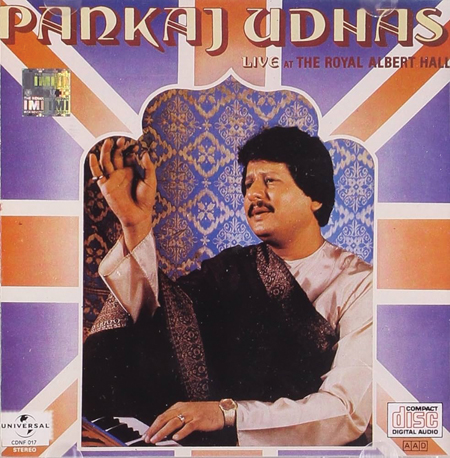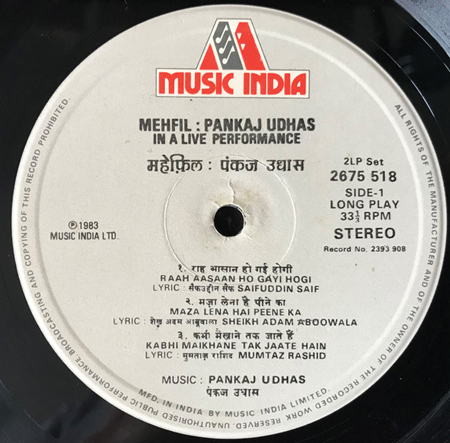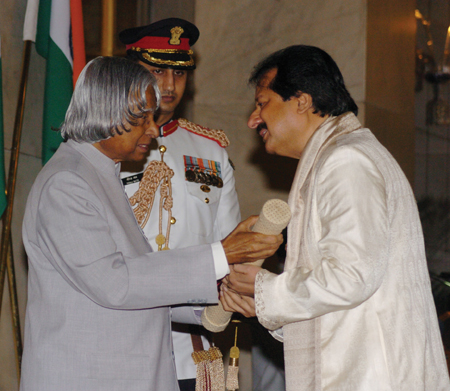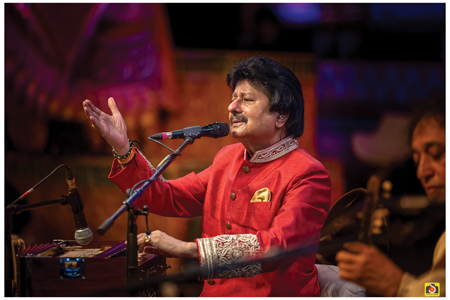Tribute: Aaj Udaas Hai Maikhaana

The world mourns the loss of Pankaj Udhas, the Padma Bhushan awardee, whose contribution in popularizing ghazals in our times cannot be understated.
[Left][ Photo https://www.youtube.com/@Pankajkudhas.jpg]
Ghazals, the lyrically rich songs about love and the divine, were the poetry of the Sufis. Today, if they are enjoyed by the masses, it is in no small part because of Pankaj Udhas, who, in the ’80s, started making them more relatable. What followed were hits such as “Chithi Aayi Hai,” “Chandi Jaisa Rang Hai Tera,” “Ghungroo Toot Gaye,” and countless others that made Udhas the reigning pop icon of ghazals.
This runaway success could be traced back to his initiative of making the language of ghazals more accessible. In an article in the Statesman, Udhas commented, “Poets like Mirza Ghalib wrote in a mix of Persian, Arabic, and Urdu, which was difficult for the common man to decipher.” In his quest to take ghazals to a wider audience, he collaborated with modern poets such as Zafar Gorakhpuri, Nida Fazli, and Mumtaz Rashid.


The ’80s was Pankaj Udhas’ decade, with one hit album following another!
In contrast to the spiritual heights of Sufi-inspired odes to the divine, Udhas’ brand of ghazals was more about earthly lovers and about spirits that are consumed in crystal glasses. The maikhaana, a tavern where patrons come together to romanticize loss, longing, love, and ecstasy, is a recurring theme in his ghazals. It is a place where emotions flow as freely as wine, both of which can cause one to become unpredictable, addicted, and all-consumed. A maikhaana is where one freely indulges in the human tendency to seek solace and escape from life’s hardships through intoxication.
 Udhas was born in 1951 into a family of zamindars in Nawagarh village in Gujarat, where his grandfather was the diwan (revenue minister) of the district of Bhavnagar. He inherited musical vibes from his father who had started learning the dilruba, a stringed instrument, from Ustad Abdul Karim, a renowned veena player and founder of the Khairana Gharana. Both of Udhas’ brothers, Manhar and Nirmal, also became professional singers.
Udhas was born in 1951 into a family of zamindars in Nawagarh village in Gujarat, where his grandfather was the diwan (revenue minister) of the district of Bhavnagar. He inherited musical vibes from his father who had started learning the dilruba, a stringed instrument, from Ustad Abdul Karim, a renowned veena player and founder of the Khairana Gharana. Both of Udhas’ brothers, Manhar and Nirmal, also became professional singers.
[Right] Udhas receiving Padma Shri from the late Dr. A.P.J. Abdul Kalam, President of India at the time (2006). (Photo: President’s Secretariat, GODL-India)
Soon after his formal study of music at the Sangeet Academy in Rajkot, where he studied tabla, Udhas went to Mumbai where he pursued a Bachelor of Science degree at Wilson College. In Mumbai, he began learning Indian classical vocal music under Navrang Nagpurkar, a singer from the Gwalior Gharana. He also started studying Urdu, mainly because of his passion for ghazals.
Udhas’ singing career began in 1972 with a solo for the film Kamna. That was a lucky break, considering that at the time, filmmakers largely depended on popular playback singers such as Mohammad Rafi and Lata Mangeshkar, making it difficult for new entrants.

“My heart was always with ghazals. Cinema [singing], though it was an attraction, was never the first choice,” said Udhas. (Photo: https://www.facebook.com/santoshshinde.photography)
In the midst of this stress of finding a footing, Udhas left for Canada and the United States, where he performed a series of ghazal concerts over a period of ten months. This turned out to be a game changer. Emboldened by the gushing appreciation for his ghazals, he returned to India and, in the following decade, honed his craft as a ghazal singer, ultimately making it his specialty.
Udhas started to achieve commercial success in ghazals in 1980 with the release of the album titled Aahat. This was followed by several other hit albums: Mukarrar (1981), Tarrannum (1982), Mehfil (1983), Pankaj Udhas Live at Royal Albert Hall (1984), Nayaab (1985), and Aafreen (1986).
Thanks to a series of massively successful ghazal albums, Udhas now also found more traction in Bollywood as a playback singer. One of his most famous songs was “Mahiya Teri Kasam,” a duet with Lata Mangeshkar, for the 1990 film Ghayal.
Throughout his career, Udhas made several international tours. He said in an interview, “Nothing beats seeing the love, adulation, and support that I receive every time I perform [overseas]. To be able to travel across the world and sing for my fans who do not always have a chance to see me perform in India is what truly inspires me.”
As the contemporary face of ghazals, Udhas lamented the growing Western influence in India which was crowding out traditional art forms such as the ghazal. In an article in the Indian Express, he is quoted as saying, “[Now], we do not have the mind to think in Hindi; we think in terms of Hollywood. This is certainly a setback for ghazals.” As per an article in the New York Times, Udhas says, “My heart was always with ghazals. Cinema [singing], though it was an attraction, was never the first choice.”
After a prolonged fight with cancer, the beloved singer, who was bestowed with India’s prestigious Padma Bhushan award, passed away at Mumbai’s Breach Candy Hospital on February 26. According 11to a tribute in The Millenium Post, Udhas “was a legend whose contributions have shaped the cultural fabric of Indian music. His story is a beacon for future generations, illuminating the path of artistic pursuit and the timeless appeal of ghazal.”
Nikhil Misra-Bhambri is a freelance journalist living in Los Angeles, California. He graduated in history from the University of Southern California and writes about relationships between cultures, cuisine, music, and history.
Enjoyed reading Khabar magazine? Subscribe to Khabar and get a full digital copy of this Indian-American community magazine.
blog comments powered by Disqus











